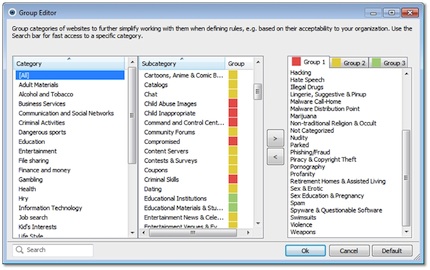ESET Releases New Editions of AV and Endpoint Security Software
- By Dian Schaffhauser
- 06/20/12
A company with endpoint security products has launched new versions of those, as well as new names. ESET has released ESET Endpoint Antivirus as a replacement for NOD32 Antivirus 4 and ESET Endpoint Security to replace Smart Security 4. The company, which is perhaps better known in Europe, has a reputation among its customers for its light footprint and fast scanning.
The anti-virus product addresses threats that include viruses, Trojans, keyloggers, adware, spyware, and rootkits. The new release has a much enhanced device control feature with greater granularity. This allows the security administrator to set policies for individuals or groups of users that define whether or how they're allowed to use removable devices, such as USB thumb drives. As Director of Product Marketing Jeff Chen explained, a school might choose to deny the use of USB devices except for a single model of device with a specific set of serial numbers to be used by an IT team. Rules can also be set to perform scanning of material upon insertion into a computer on the network.

ESET Endpoint Antivirus allows administrators to group Web sites into 140 categories to apply rules and policies. |
ESET Live-Grid, a new "file reputation" feature, uses an anonymous and voluntary network cloud service to collect information about malware and suspect files to establish the safety of a given file. The system administrator can set the level of participation in the service, such as how often to submit files and what types of files to submit. Then the software uses that reputation data to expedite scanning of certain content. "If it's been recently scanned, we can say it has an excellent reputation, therefore we can do less scanning or skip scanning," said Chen. "Before we push out signature updates, we'll compare those to the file reputation database."
The new release also offers an updated version of the host-based intrusion prevention system that monitors system activity and uses rules to recognize suspicious system behavior. The update offers more precise policy settings in five modes:
- Automatic, which runs without administrator or user intervention;
- Interactive, for use when an administrator wants to specify what's allowed or denied;
- Learning, which sits in the background and generates rules from observing how the system behaves. With this mode the administrator can review and edit rules;
- Policy, in which all operations are denied; and
- Presentation mode, useful for those times when the user is making a presentation and needs to defer non-essential scheduled tasks and stop popups.
The anti-virus release also allows now for signature and module rollback, which lets the administrator revert to an older version of the security signature and control how updates will be handled.
ESET's Endpoint Security product includes the anti-virus release along with several other features:
- Web Control, a new content filtering function to limit Web site access. It allows the security administrator to set policies from 140 categories of sites against which to apply rules that comply with company policies;
- A firewall feature lets users maintain separate firewall profiles on their computers to work in different types of environments, useful for users who travel with their laptops;
- An anti-spam capability works with the major email clients. This feature has been included in previous editions of the program, Chen said. The newest version has improved usability and spam detection; and
- Module-based installation allows the administrator to customize which features go on which machines.
Both the anti-virus and endpoint solutions can be managed through the ESET Remote Administrator, a management console included with either edition.
The non-discounted pricing for a five-to-ten-user bracket starts at $32.99 per machine per year for anti-virus and $40.99 for the premium endpoint product. However, the company offers education discounts and volume-based pricing.
About the Author
Dian Schaffhauser is a former senior contributing editor for 1105 Media's education publications THE Journal, Campus Technology and Spaces4Learning.